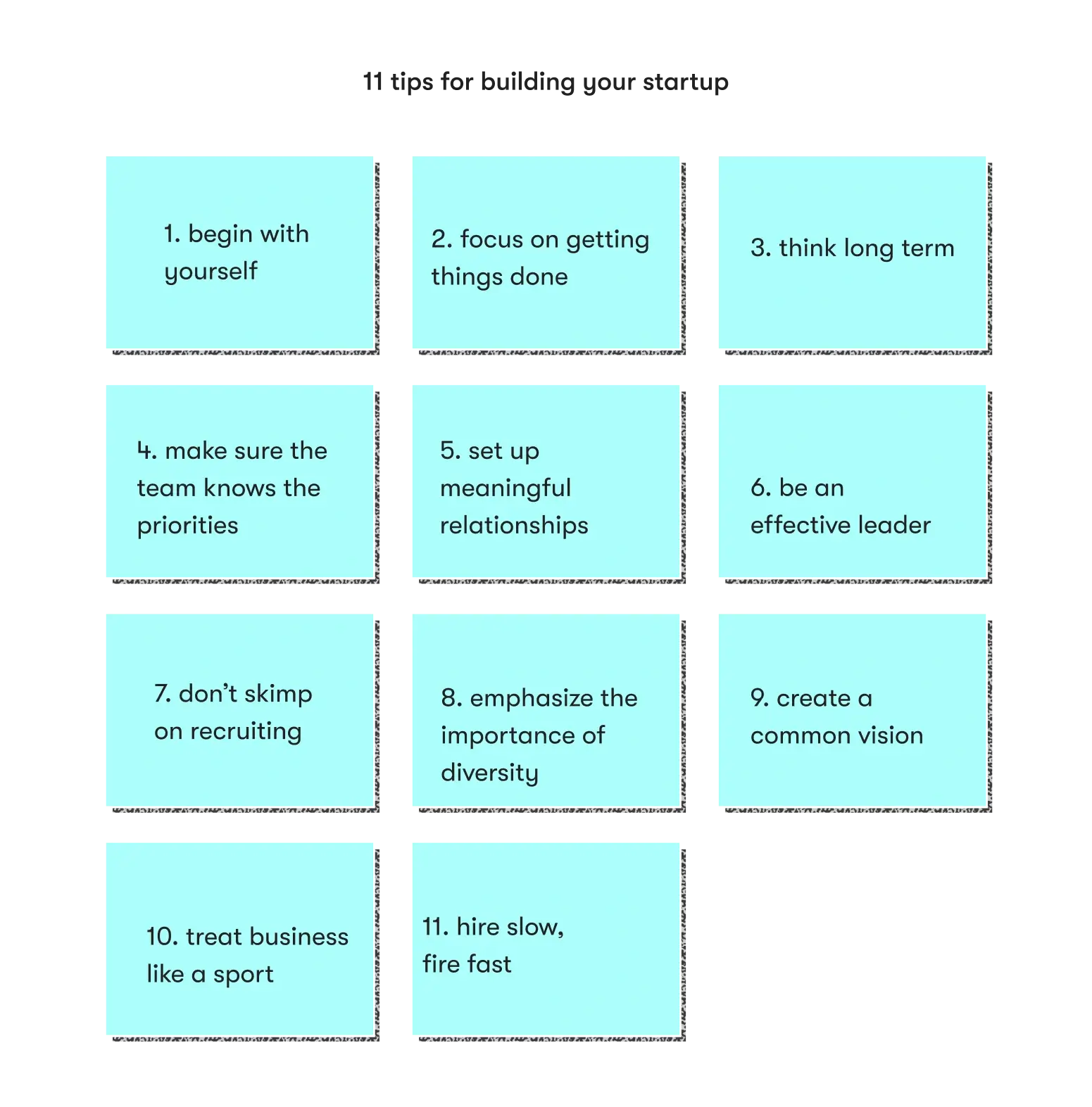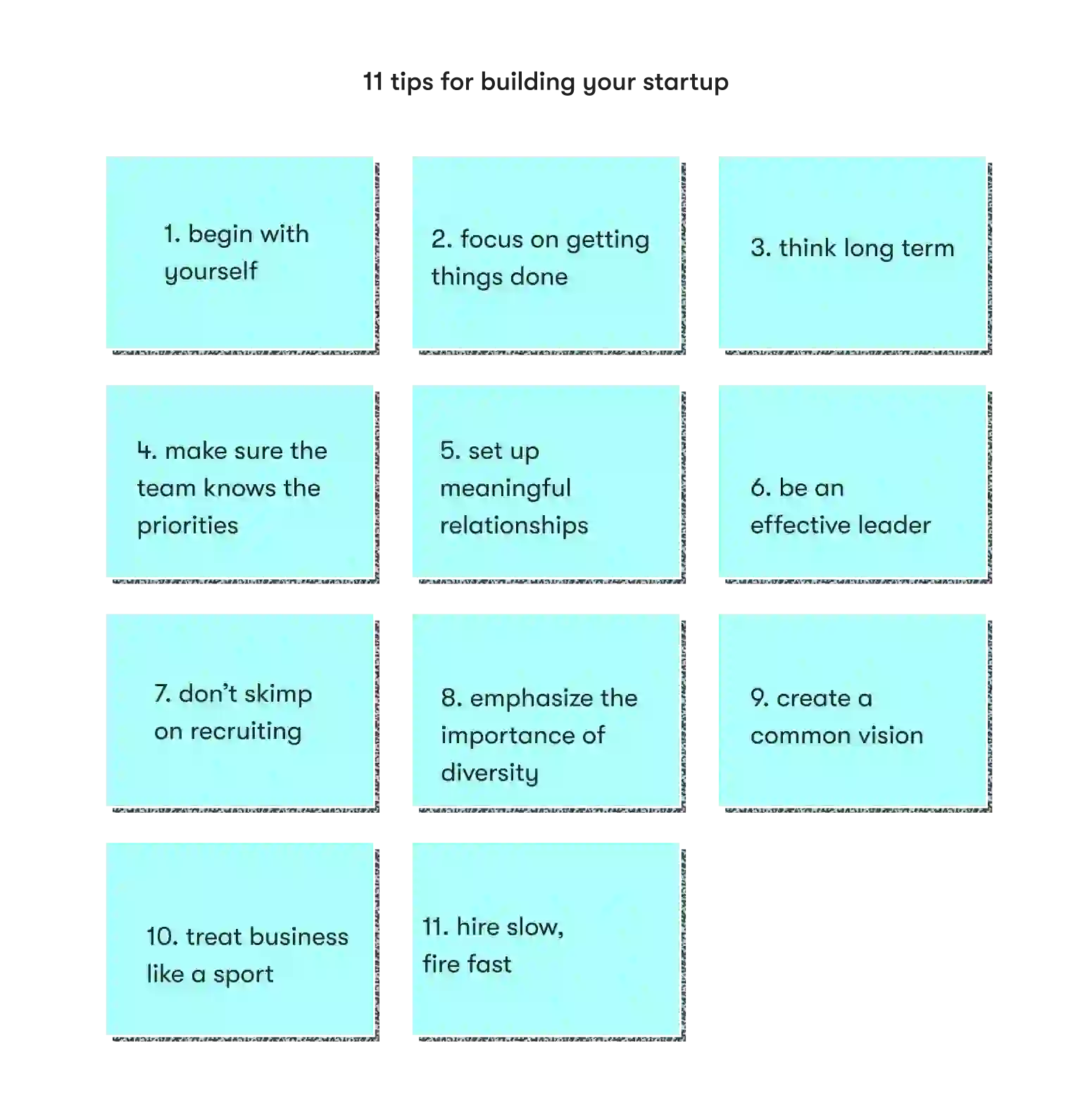The path of any startup to stunning success begins with a winning team. The employees you work with can make or break your young project. The team will determine whether a startup will turn into a thriving and promising business or die in the early stages on the way to victory. And this is confirmed by the success stories of every notable startup around the world.
So, building a great startup team is half the battle. However, finding the right people who share your desire and passion is not so easy. Winning teams are always made up of partners — those who share thoughts and views, and who have different points of view but a common end goal.
In this article, we will provide a step-by-step guide on how to form a startup team and tell life hacks that will make your team extremely involved and motivated. We will also share where to find teammates for a startup quickly and at affordable costs, and speak about how to choose developers who will attract investors’ attention.
Why Is It Important to Form a Startup Team at the Beginning?
Regardless of the impeccability of the strategy and the genius of the idea, it’s not single players who always win, but teams. The fact is that investors give money not for an idea, but for a startup team. And it is the team that can be the decisive factor in whether they will invest in your startup or another.
The analysis of dead startups proves that the choice of the one-person team strategy is one of the top 3 mistakes that cause 90% of startups to fail. In fact, there is no such thing as an individual entrepreneur, and a successful business is not created from scratch alone. It is always a collective effort aimed at achieving a common goal.
The vital importance of the right team is also confirmed by research results. Statistics for 2021 show that the wrong team is one of the main reasons for the failure of startups and young businesses around the world. So, according to the survey conducted among startup owners, team building, staff problems, and other recruiting issues are among the key reasons why startups didn’t work, investors didn’t give money, and as a result, companies went bankrupt. And this only confirms the fact that behind every winning startup is a victorious team.
So, it is very important in theory, but not very easy in practice. Let’s look at a step-by-step guide on how to form the right team for any startup.
6 Steps to Make a Team for Your Startup
Trying to figure out how to make a team to start a startup? Here are our 6 easy steps that will help you build a good startup team for your young business in the best way.

Start with CEO Skills for Building a Good Team for a Startup
First and foremost, determine the hard and soft skills you need as an aspiring entrepreneur to create not only a team but also a business as a whole. It would seem that the CEO should be as versatile as possible, but in fact, the necessary skills for successfully creating a startup team come down to five main ones.
Among the key traits you should possess are leadership and management, strategic business planning, critical thinking and problem-solving, accounting and reporting, web development, sales, and marketing.
Make sure it’s all about you. And then move on to recruiting team members who share your goals, vision, desire, and aspiration. By having the right CEO skills and knowing what people you need, you can build your startup team effectively and prospectively.
Identify the Co-founder Role
As we have already said, business is not a story about one person. Even if you are perfect for the role of a startup leader, the best solution would be to think about a co-founder.
Finding the right person for this position can be a daunting task, as the success of your entire startup team may depend on this step. Here you can face many challenges, but the main thing is to look for a candidate who has the necessary competencies and also has a business vision similar to yours.
In a partnership, it is very important to find “your” person, as you will go side by side throughout the joint management of the business.
How do you find the perfect co-founder candidate? Your potential colleague should help fill in the gaps and have skills or experience that you don’t have. Also, remember that you must find an absolute soul mate who shares your passion and your idea. Remember that building a team for your startup is painstaking, difficult, and stressful work, and strong partners nearby is exactly what you need.
Determine Key Roles in the Startup
After the issues with the management of your project are closed, it’s time to move on to the selection of teammates for other key positions. Decide what roles you need and start building a tech startup team. Look for diverse, reliable, engaged team players who can take on various tasks and manage different directions of the business. Be selective and spend as much time looking for ideal candidates as you need.
Unicorn and Zebra Employees: Who Is the Best for Key Roles?
Having an idea of who you are looking for will make it easier for you to find the perfect teammates. Decide on a business model and hire the right Unicorn or Zebra employees.
In business today, values that are strongly shaped by the cult of startup culture are increasingly appreciated. And this culture is mostly associated with “magical thinking” and rapid growth.
In the startup world, innovation and so-called “fantasy thinking“ are crucial, and this leads to a hunt for Unicorns. But Unicorns don’t exist. And such gambling, as practice shows, often contradicts real success. Focusing on unthinkable success is great, but often it has nothing to do with reality. The Unicorn concept may be a winning one, but it won’t create a sustainable business.
Therefore, it is worth giving preference to what is real, so as not to kill your startup. Choose a Zebra culture.

Zebras are focused on a collective result; they are hardy, fast, flexible, and efficient. They survive under various conditions and think asymmetrically. And most importantly, Zebras are generalists and natural team players, while Unicorns are loner leaders.
Experiments, innovations, bold ideas, creativity, and out-of-the-box thinking are definitely what any startup is built on. However, remember that when building a strong startup, you must prioritize sustainability and good relationships with employees and customers. Don’t prioritize profit. It is a logical consequence of doing business right.
Don’t chase unattainable Unicorns, but look for real Zebras who can do real tasks and solve real problems. And remember that the perfect candidate, like the Unicorn, does not exist.
Your business culture is your choice. And your leadership creates your organization. Will your startup focus on profits? Or will people be preferred? The choice is yours.
How to Hand Over Your Passion and Key Idea
The idea is the basis of a startup. Without it, there will be no project, and without the understanding of it by the team members, there will be no implementation. Therefore, it is very important to broadcast a clear vision and passion to every employee. They must understand this and share.
You must be on the same page with your colleagues and understand the common end goal. And you have to make your team really want to be on the same wavelength.
Convince all employees and make them believe in your vision, which must lead to a better life for your end-users. And each teammate should feel responsibility for this. They must understand their value and their role. Then your team will put their soul into the work.
Follow your passion and success will come.
How to Motivate and Involve Your Team for Significant Results
It is not enough just to find the right employees. Do not think that the team will lead your startup to success on its own. You can rely on your colleagues, but you must motivate and engage them to make their activities as effective and profitable as possible for your business.
You must do your best to not let those who are good for you leave. To do this, your company must always remain an attractive place to work, and you must think about compensation for your team. Be creative and use an individual approach in the formation of a job offer.
Young businesses often do not have large budgets and financial resources, and your employees understand this. They did not come for a high salary, but for a win in the future. However, try to make your offer competitive and sustainable, offering pay and benefits that are available to you.
And remember the key importance of trust. Be honest with your teammates and communicate openly about potential project prospects and possible rewards. Tell them how their compensation will increase if the startup is successful.
Don’t forget about creative bonuses and perks, such as flexible hours and plenty of days off, free meals or vacation packages, gym memberships, or language courses. All this can not only attract but also keep team members in your project. This is an indicator of caring for employees and ensuring a work-life balance.
Remember that people often come to startups for new experiences, networking, skills, and opportunities. Provide it all. Do your best to make your company truly the best place to work. Your team needs to believe in your idea, understand the value they can bring, and see the potential success of your startup.
And the main secret is that the team in a startup is precisely what creates a new product and a key value — exactly these two points bring profits in the future.
BUILD A VICTORIOUS STARTUP TEAM WITH EPAM STARTUPS & SMBS
Get a motivated development team to help you successfully go from a young startup to a thriving business. Choose from team extension or dedicated team options.
11 Tips for Startup Team Building
Now that we know how to completely organize the process of making a team for a startup, let’s look at the tips and tricks that will help you build a startup team more efficiently, faster, and easier.
Team building must be approached selectively and strategically. Therefore, you must be aware of the proven strategies and business insights. Here is how you can form a great and winning startup business team that will definitely benefit your startup and lead your young company to success.

Begin with yourself
Remember the main thing you need to know about building a team: it all starts with you. And it requires a lot from you. Be prepared for the role of leader and all that comes with it. You have to make difficult decisions, and also realize that all team members will rely on you in many ways.
You are the backbone of your startup, which means that your first task as the head of the team is to explore yourself. Self-awareness is a must-have. Objectively identify your strengths and weaknesses and project those traits onto your startup. Find out what you can offer and evaluate the value it will bring to your young business.
You need to make sure that you have all the necessary traits to scale or pivot your startup if needed. And remember that you should pay attention not only to hard skills, but also to soft ones.
Moreover, skills such as dependability, teamwork, flexibility, and problem-solving are very often even more important for those who play a leadership role. Your personality, your values, and your beliefs are what come into play in such a scenario.
And only after you objectively and fully evaluate yourself, go to your team. Do what you do best, and for everything else, find the right people. A winning startup is always one that has complementary team members.
Focus on getting things done, not just ideas
The idea is good, but it is definitely not enough for a successful and profitable business. Hire employees who can cope with the tasks and do the job well. You must form a team that will not only generate ideas but, most importantly — bring them to life.
When recruiting, focus on candidates who have the right skills for your business. And remember that in the initial stages, a startup is very resource-intensive and labor-consuming. Problems occur very often, which means that your collective must quickly and extremely effectively fix them. Be an entrepreneur who is always ready for potential troubles and build a team that can handle them.
Think long term, don’t limit yourself to a startup
No matter how paradoxical it may sound, you shouldn’t form a team for a startup. Always remember that the project launch phase is only the beginning. And it is this awareness that should be the fundamental trajectory of your movement.
A startup is a temporary phenomenon, while a long-term and viable business is your key goal. Nevertheless, this initial phase is the main one and the long-term perspective largely depends on it. However, even in the very early stages, you must think about what will happen over time.
So, your business will not always be a startup. Strategize your project and build your team in such a way that you not only ensure the minimum viability of your business but also be ready to scale it further. Think about a long-term vision for your business and do everything you can to bring that vision to life.
Make sure the entire team realizes the importance of customer service
Despite the fact that it seems obvious, often customer service is the responsibility of only one department. However, this should be the main thread of your entire business. The whole team should think about clients and all activities should be aimed at their satisfaction.
The main indicator of business success is income. However, the main thing that all your employees should be focused on is the end-users. Only that approach can lead you to achieve your profit goals.
And this is exactly what is critical for startups. In the initial stages, you most likely won’t have the opportunity to build a huge team. And this means that every member of your small team should be involved in such an important direction of the business as customer service and working with clients. Always remember what is important to users.
Team relationships matter
The overall climate in the team is much more important than you might think. As we have already mentioned, your employees are what the success of your business depends entirely on. And here it is important to understand that it is not only about individuals, but mainly about their relationships.
Make sure that there are no disagreements in your team. Your employees should not be the same and think alike, but interpersonal relationships should not interfere with work.
Bad relationships within the team are what will destroy your startup even before it launches. All members must work well together and move towards one common goal. This is vital because any business is always about the team.

Be a truly effective leader
The main thing you have to remember is that it all depends on you. As the head of the team, you must establish mutually coordinated and effective work within the team.
You must know well not only yourself but also each of your employees. Then you can become a truly excellent and effective leader of your team.
Your goal is to make sure that all co-workers work together and towards one common goal. You must achieve absolute understanding among team members, ensure complete alignment, and combine the skills of your employees into one coherent mechanism.
Don’t skimp on recruiting
The first thing you must understand is that highly skilled and passionate developers don’t work for an idea only. And to find, check, and hire programmers for a startup might be not that cheap.
So, how can you save money at this stage? In terms of cost-effectiveness, you have two options: hire the cheapest ones (who will most likely need to be changed in the near future) or look for the best developers at affordable costs.
Obviously, the second option is what you need. And here, applying for recruiting services becomes the right decision. Despite the fact that you will have to pay for this help, it will pay off in full. The potential benefits of building an effective and great startup team far outweigh the costs of creating it.
One way or another, startup team building is exactly what you should definitely not save on if you want to launch a successful and winning business on the market.
Don’t underestimate the importance of diversity
Startup development is always a matter of creativity. And creativity, in turn, does not accept monotony. This applies to everything. And first of all, to the team that will implement your idea.
Do not allow homogeneity in your team. Your employees should not be interchangeable. A lack of diversity in views, opinions, and positions among colleagues has the potential to destroy your startup in the early phases. It kills creativity, and without it, no project can survive.
Different people bring their own versatile personality that adds value to the collective. In any team, there must be a place for balance and different ideas, for complementarity and competing views, for improvisation and experimentation, for opposition and conflicts in which thought thrives.
Make sure the whole team has one common vision
Yes, team diversity is critical. However, there is something in which all its members should have the same views. And this is a common vision.
A collective effort to achieve a single end goal is what will lead a startup to success. And for this, it is necessary that each employee is aware of the common vision. You must completely eliminate any potential misunderstandings that can lead to demotivation and discord within the team.
Make sure team members know your plans and that they share them. This approach and a compelling vision are part of the corporate culture and will definitely become your advantage when hiring employees and building a team.
Treat business like a sport
It may seem strange, but sports and business have a lot in common. And startup entrepreneurs definitely have a lot to learn from this industry.
Sports teams teach us that each member has a role. And despite the fact that each player is responsible only for their own work, they are flexible enough to change according to the general conditions. Competitor research, a clear path to follow, continuous learning, focus on the specific role, and the ability to adapt to ever-changing business conditions are key to success.
And the main point is that achieving absolute mutual understanding in a team is possible only after well-coordinated and effective work at the individual level. All of these strategies are relevant to building a team for both sports and business.
Hire slow, fire fast
Your task is not to build a huge employee base, but to make the most of a viable team.
The “hire slow, fire fast” team-building principle says that you should not rush when selecting candidates and should also leave only suitable employees in the collective. Your main focus should be on building a team slowly and diligently.
Don’t settle for those who aren’t right for you, and continue to conduct thorough employee appraisals even after the hiring process is completed. Your main goal is to improve the efficiency of your team and your business as a whole. And you definitely shouldn’t compromise if something doesn’t work for you.
CONSIDER EPAM STARTUPS & SMBS TO HIRE THE BEST STARTUP TEAM
Building a team is hard, and building a startup team is even harder. Choose professionals to prevent irreparable mistakes at the beginning of your business journey.
Where and How to Search for People to Build a Startup Team
So, how do you build a team for a tech startup? Here is our ultimate guide in which you will learn where and how to find employees, as well as which ones.
An Interview to Hire Developers on Your Own: What to Pay Attention to
After you have selected a few suitable candidates, you move on to the next stage — the interview. Your main task is to choose a developer who is best suited for your startup. During the interview, you should find out the background of potential candidates, their completed projects, what successes they have achieved, and how they coped with difficulties.
Remember that both hard and soft skills are equally important. You should choose the right person who can handle the required work and who also fits into your startup’s corporate culture.
Revealing Points During and After an Interview to Succeed
Remember that not only you choose, but you are also chosen. You should think not only about how to find the ideal employee, but also about how to become the perfect place to work.
During the interview, you should not only evaluate the candidates but also find out their needs, problems, and requests. And in case of hiring, try to fill them.
The main thing in a startup team is motivation. And if you become a dream job for your teammates, rest assured that they will do their job in the best possible way. This is the secret of successful collaboration.
Also, don’t forget about learning strategies and career growth. This is all an additional incentive for your team, as well as additional opportunities for your business. Win-win solution!
How to Pick the Right Person
First, you should conduct a detailed analysis of yourself and your project. You must understand who and for what goals, tasks, and solutions you are looking for. Once you know which roles you have available, you can search for suitable candidates for them. Take into account both the professional competencies required for a particular position, but also do not underestimate personal qualities. Always remember that you are not just looking for a good specialist, but also a member of your team.
Your ideal candidate must be the perfect team player with impeccable skills and relevant experience.
In-house Developers: What Are the Pros and Cons of This Engagement Model?
Hiring in-house developers (local or with relocated) is the classic way to build a team, but it always takes a long time and needs some extra costs. However, such an option of building a team is beneficial in many ways: passionate with the same idea, team building, and clear communications — all this is so advantageous and necessary for a young project.
But there are also pitfalls that are caused by hiring an in-house team. So, traps and difficulties like solid costs, less flexibility, and long deadlines to hire make this option less attractive. Especially if you want to create a team for your startup a bit faster than in 9-12 months.
To deal with these challenges and speed up this process, you can increase your recruiting efforts and resources or consider other hiring options for your startup. And always remember that your main priority is to find the right people, but not to do it quickly.
Remote Developers and Teams: How to Take Advantages and Improve In-house Developers
Hiring remote developers is a great way to complement the team and fill the gaps. This type of cooperation is beneficial for a startup in terms of flexibility, adaptation, scaling, and additional opportunities.
And most importantly, it is cost-effective, which is critical for start-up entrepreneurs. This is a great opportunity to save on equipment, as well as find talented developers from regions with lower rates.
Freelancers for a Startup Team: Why Not?
Hiring freelancers is often the best solution for any business. But not when it comes to a young startup. Such employees are great for large and well-established companies that have fully organized all business processes.
And in the case of a young project, it is necessary to look for full-fledged teammates who will be involved in a startup and help it move along a winning trajectory. Freelancers will not be extremely motivated and completely engaged with your business, which means they will not bring the necessary value to it.
Best Practices of EPAM Startups & SMBs in Startup Team Building
For startups, EPAM Startups & SMBs offers two cooperation options depending on the goals and needs of the business: team extension or a dedicated team. The first one is suitable for those young projects whose goal is to scale the team and hire employees on demand for a specific scope of work. And the second one is a solution for those startup entrepreneurs who want to delegate their entire project or part of it to dedicated groups of specially selected developers.
EPAM Startups & SMBs is an effective solution for every fast-growing startup. This is what will help you reliably and successfully bring your business ideas to life.
EPAM's Clients Speak About Their Experience
EPAM has been providing software engineering services since 1993. EPAM’s completed projects and our satisfied customers speak for themselves.
Among the most notable cases are XKD: Brand and Customer Experience Redesign, Insulet: Omnipod Management System, ImageNPay: Making Digital Payments Interactive and Carbon Neutral. Each of these startups had various challenges, and EPAM’s team managed to find advanced solutions and achieve impressive results.
Conclusion
Even if you run a startup yourself, not only you will be behind the business. And the future of your project depends entirely on who you work with. The teammates can give your business a strong advantage, attract investors’ attention, and lead your startup to tremendous success. And finding such people and getting them on your team should be your top priority.
Building a sustainable and strong startup team requires not only an entrepreneurial mindset, but also hard work and dedication. This is often difficult, but worth it.
We at EPAM Startups & SMBs understand this and help young businesses realize the importance of the right team for the success of a company. Contact us to learn more about how your startup can get the most out of an efficient and advanced team.
Top-notch developers experienced with the Forbes TOP 100 are available for your startup!
FAQ

Anush has a history of planning and executing digital communications strategies with a focus on technology partnerships, tech buying advice for small companies, and remote team collaboration insights. At EPAM Startups & SMBs, Anush works closely with subject matter experts to share first-hand expertise on making software engineering collaboration a success for all parties involved.
Anush has a history of planning and executing digital communications strategies with a focus on technology partnerships, tech buying advice for small companies, and remote team collaboration insights. At EPAM Startups & SMBs, Anush works closely with subject matter experts to share first-hand expertise on making software engineering collaboration a success for all parties involved.
Explore our Editorial Policy to learn more about our standards for content creation.
read more





















